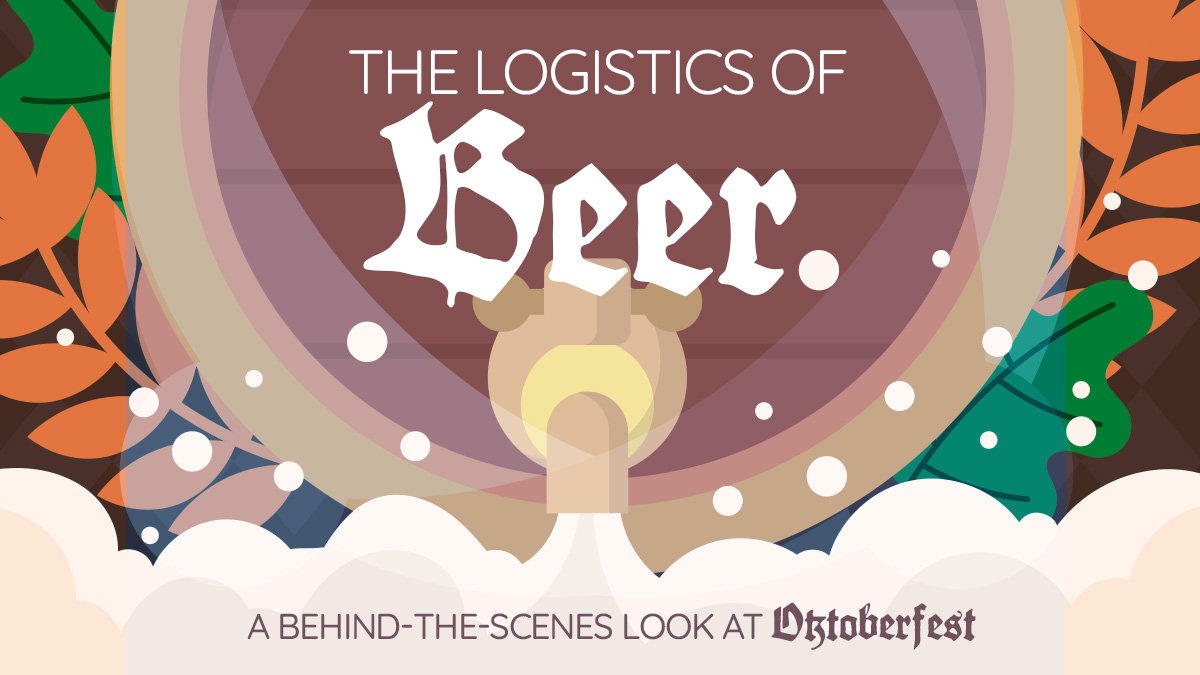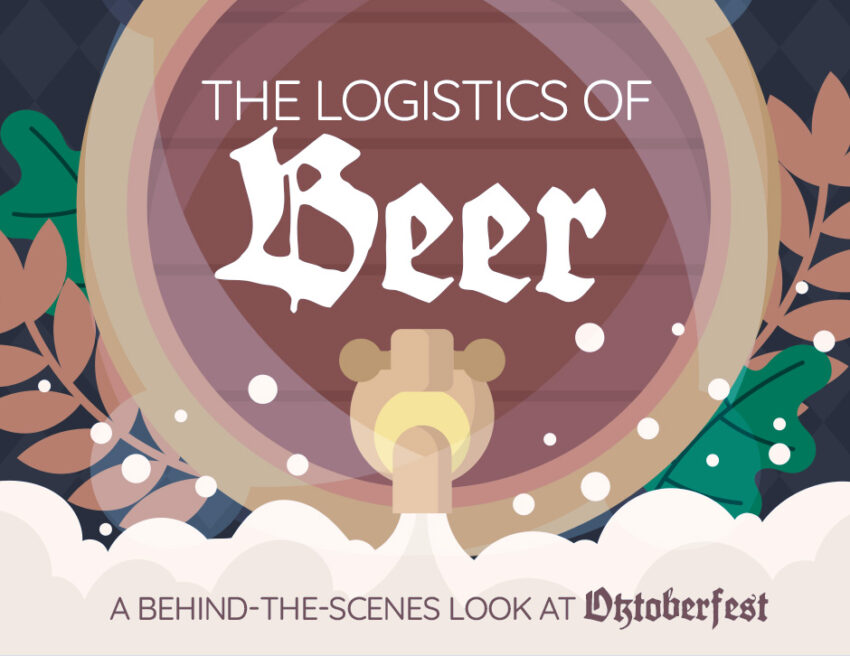Oktoberfest, the world’s largest beer festival, attracts millions of visitors to Munich, Germany, every year. With its rich cultural heritage, this celebration of Bavarian tradition is synonymous with beer, food, music, and revelry. But behind the scenes of this iconic event is an intricate logistical operation that ensures beer flows smoothly into the hands of festival-goers. From the production of vast quantities of beer to the transportation, storage, and distribution of this beloved beverage, the logistics of beer during Oktoberfest is an immense challenge. As Germany is celebrating Oktoberfest this time of the year, in today’s blog, we’ll explore the details of Oktoberfest and the vital role logistics plays in making sure the event runs like clockwork.

A Glimpse into the History of Oktoberfest
Oktoberfest dates back to 1810 when Bavarians first celebrated the wedding of Crown Prince Ludwig and Princess Therese of Saxe-Hildburghausen. Over the years, the festival has evolved into a cultural celebration held annually in Munich, attracting over 6 million people from all around the globe. While it features parades, live music, and traditional foods, beer remains the focal point of the festivities.
The beer served at Oktoberfest is special. Only six Munich-based breweries are allowed to serve beer at the event, and they must adhere to the Reinheitsgebot or the German Beer Purity Law, which dictates the ingredients allowed in beer production. Each brewery crafts a unique lager specifically for the festival, brewed with more malts and a slightly higher alcohol content than their year-round varieties.
The challenge of ensuring these massive quantities of beer reach the festival tents is one that involves coordination between brewers, transporters, and event organizers.
Brewing in Mass Quantities: Preparation Begins Early
The logistics of beer for Oktoberfest start months before the event begins. The six authorized Munich breweries—Augustiner, Hacker-Pschorr, Hofbräu, Löwenbräu, Paulaner, and Spaten—start brewing the special Oktoberfest beer early in the year. These beers are brewed in larger quantities than normal to meet the overwhelming demand of festival-goers.
The amount of beer required is staggering—an estimated 7 million liters are consumed during the festival’s two-week run. Each brewery works to carefully craft enough beer while ensuring consistent quality across the board. The beers are brewed in large batches and stored in refrigerated tanks to keep them fresh and ready for transportation to the festival grounds.
Transportation Challenges: From Brewery to Festival Grounds
Transporting millions of liters of beer from the breweries to the Oktoberfest grounds in Munich is no small feat. In order to maintain the freshness and quality of the beer, the logistics process requires careful planning and precise execution. The beer must be transported from the breweries to the festival grounds in specialized trucks designed to maintain the correct temperature and prevent the beer from becoming too agitated.
These trucks are equipped with cooling systems that ensure the beer remains chilled during transit. The transportation process typically begins a few days before the festival, with trucks making multiple trips between the breweries and the festival grounds to ensure that each beer tent has enough supply. The timing is critical—beer must arrive on time to prevent any delays in the festival’s operation.
The sheer volume of beer being transported also presents challenges. Festival tents are enormous structures that house thousands of guests, and each tent requires a steady supply of beer to keep patrons satisfied. Logistics teams work around the clock to ensure the tents are always stocked, making sure no one is left without a full stein.
Distribution at the Festival: Ensuring a Smooth Flow
Once the beer arrives at the Oktoberfest grounds, the next phase of logistics takes place. The beer is pumped directly into massive holding tanks within the tents, where it is ready to be served to the festival-goers. Each tent has its own distribution system, which includes hundreds of taps and an army of waitstaff responsible for delivering the beer to patrons.
To handle the vast amount of beer being consumed, organizers have implemented a carefully designed distribution system. The process is fast-paced, and efficiency is key to ensuring that visitors don’t wait long for their drinks.
One of the challenges in this stage of logistics is managing the sheer number of people in each tent. With tens of thousands of people in attendance at any given time, organizers have to ensure that beer distribution is not only quick but also orderly. This requires experienced staff, detailed planning, and constant coordination with suppliers to replenish stocks as needed.
Cold Storage: Maintaining the Right Temperature
Temperature control is essential to ensuring the beer remains fresh throughout the festival. While the beer is brewed and transported under carefully controlled conditions, it also needs to be stored properly at the festival grounds. Tents are equipped with large refrigeration units to keep the beer cool, and organizers carefully monitor the temperature to avoid any fluctuations that could affect the taste or quality.
For Oktoberfest, maintaining the ideal serving temperature is particularly important. The traditional Märzen beer is best enjoyed slightly cooler than room temperature but not ice-cold, allowing the flavors to fully develop. The logistics teams work closely with the breweries to ensure that the beer is served at the perfect temperature, providing guests with an authentic Oktoberfest experience.
Sustainability and Waste Management
With millions of visitors and massive quantities of beer being consumed, waste management and sustainability are important considerations. Organizers take steps to minimize the environmental impact of the festival, including recycling bottles, cans, and waste produced by the event. Beer logistics at Oktoberfest also involve handling the packaging and disposal of wooden beer barrels, ensuring they are reused or recycled appropriately.
Some breweries have also started incorporating sustainable practices into their logistics operations, such as using electric vehicles for beer transportation or adopting eco-friendly packaging materials.
Conclusion: Beer Logistics – The Lifeblood of Oktoberfest
Oktoberfest is more than just a celebration of Bavarian culture—it’s a logistical marvel, particularly when it comes to beer. Behind every liter of beer served is a well-orchestrated effort by brewers, transporters, and event staff. The logistics of beer during Oktoberfest ensure that festival-goers experience the best of Munich’s brewing tradition, all while keeping the celebration running smoothly.
As millions of steins are raised in cheers, it’s worth appreciating the complex and intricate logistics that make Oktoberfest the world’s premier beer festival.


